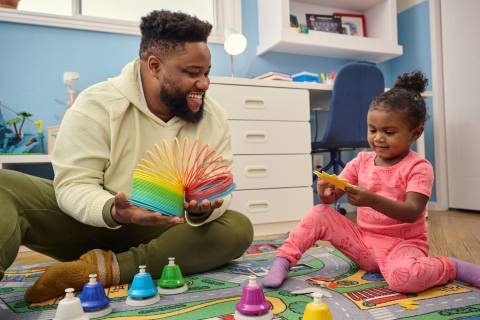Positive self-talk is like having a kind, encouraging friend inside your head who cheers you on and believes in your abilities. When you teach your child positive self-talk, it can lift their spirits, boost their confidence, and help them tackle challenges throughout their lives.

As a caregiver, you have a big impact on shaping your child's mindset, particularly during their early years. You can include any of these suggestions in your daily routines to help your little ones create a foundation of self-confidence and optimism.
Model Positive Self-Talk
We know that children learn by observing the people around them. A great way to teach positive self-talk is by showing it in everyday life. When you face challenges or make hard decisions, offer yourself praise and support. You can say, "I am proud of myself for facing that challenge."
Encourage Your Child's Inner Dialogue
Starting from a young age, teach your child to talk to themselves. This can be done through simple activities like narrating their daily experiences or voicing their emotions. When facing challenges, remind them to express encouragement, like “I can do it” or “I'm doing great.”
Praise Efforts, Not Only Outcomes
Provide constructive feedback and emphasize how your child's efforts matter. Recognize and appreciate their hard work, even if the outcome isn't perfect. This encourages a growth mindset and helps your child see their abilities as things they can develop through practice. Learn more about ways to praise your child in this article.
Validate Their Emotions
Take the time to listen to and understand your child's feelings—positive, negative, and everything in between. Validate their emotions by acknowledging and empathizing with them. This way, you create a safe space that promotes emotional resilience, fostering positive self-talk over time. Read more about helping your child cope with big feelings.
Teach Problem-Solving Skills
Encourage your child to think of solutions to their problems and work through them independently, as age appropriate. Guide them in breaking down big tasks into smaller steps. As they learn to overcome difficulties and achieve success, it will help them develop positive self-talk and confidence.
Use Positive, Encouraging Language
Introduce your child to positive affirmations, simple, encouraging statements that help your child’s confidence and belief in themselves. Examples include “I am strong,” “I am loved,” or “I am capable.” Use these affirmations frequently, make them part of your daily routine, or have your child decorate their room with affirmation posters.
Reach Out to Professionals, If Needed
If you notice that your child struggles with self-esteem or experiences persistent negative self-talk, consider reaching out to a mental health professional for support. Expert guidance can help address these issues and boost your child's mental well-being.
Helping your child develop positive self-talk is an important step in giving them a stronger start in life. By trying out these tips throughout your day-to-day life, you'll nurture a healthy, confident, and resilient child who can face challenges and thrive in every aspect of their life.






